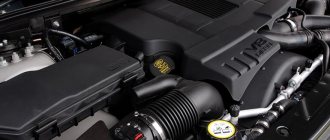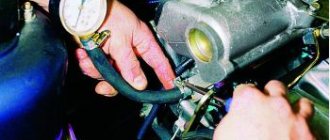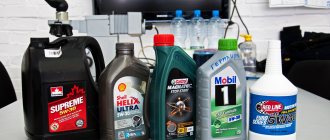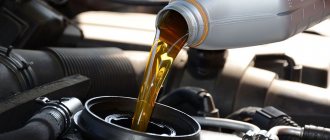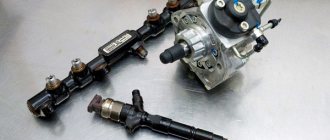If we do not consider hydrogen, electric, and other still exotic engines, all mass-produced power plants for cars are divided into two categories:
- gasoline, i.e. operating on so-called “light” fuel;
- diesel - respectively, consuming “heavy” fuel.
It would seem that in both types of engines, the kinetic energy of the controlled explosion of the fuel mixture is converted into torque, driving the car.
In fact, creating motive power from fuel calories is the only thing they have in common. So what is the difference between a diesel engine and a gasoline engine? Our material will help you figure it out.
Differences in engine operation
From a mechanical point of view, the motors are the same. Cylinder, piston, connecting rod and crankshaft. The main difference is in the fuel, or more precisely, in the method of its ignition. This is what is used as a starting point when developing other technologies.
The properties of the fuel are determined by the following characteristics:
- Engine power. With the same cylinder volume, a diesel engine has less horsepower. However, this does not greatly affect the overall riding experience.
- Torque. Despite its high power, a gasoline engine cannot provide the same traction as an internal combustion engine running on heavy fuel. This compensates for the lack of diesel power.
- Economical. Unlike a gasoline engine, a diesel engine consumes up to 30% less fuel. In some cases, this becomes a decisive factor when purchasing.
- Ecology. Modern Euro 5 and 6 standards practically equalize different engines in terms of their impact on the environment. However, when burning diesel fuel, much less toxic and synthetic substances are released. In other words, a diesel engine has a more “natural” exhaust. If such a definition fits the situation.
If we reduce the performance of different types of engines to consumer qualities, it turns out that diesel is more economical and more powerful than gasoline. The opponent can boast of accelerating dynamics and high speed.
Power and torque
Gasoline engines have shorter strokes than diesel engines. As a result, they have less torque, but produce more power and are able to spin up to high speeds. Thanks to this, gasoline engines have good acceleration dynamics. Only modern turbocharged diesel engines can compete with them in this regard. If you often transport heavy loads and need excellent traction, then diesel is your choice. Its torque is significantly higher and is fully realized at low speeds due to the higher compression ratio required for self-ignition of diesel fuel (17:1 versus 9-10:1 for gasoline engines). It is impossible to unambiguously identify a leader based on this parameter, so we move on to the next characteristic.
Diesel engine duty cycle
Scheme of operation of a diesel engine
For example, let's take a four-stroke engine (two-stroke systems are not used in the modern automotive industry). We are not considering a turbine; we will take a high-pressure fuel pump as a diesel injection system.
- Intake - the piston moves down. the intake valve opens (there may be two of them), fresh cold air saturated with oxygen enters the combustion chamber. Once the piston reaches bottom dead center (BDC), all valves close.
- Compression - The piston moves upward, compressing the air in a sealed combustion chamber. When compressed. the air becomes very hot, in some cases up to a temperature of 600°C - 700°C. When the piston reaches top dead center (TDC), a dosed injection of diesel fuel occurs using the nozzle. The fundamental issue is the creation of high pressure.
- Working stroke - Diesel fuel flares up due to air temperature, and intense combustion begins, almost an explosion. The piston moves intensively towards BDC. This cycle characterizes the performance of engines: the crankshaft rotates with high torque, which is typical for a diesel engine.
- Exhaust - the difference between diesel and gasoline engines in this operating cycle is small. The exhaust valves open and the combustion chamber is cleared of exhaust gases.
What is the fundamental difference? The methods for forming the fuel-air mixture differ. In a diesel engine, fuel is injected into a cylinder already filled with air. The gasoline mixture is formed in the intake manifold and then supplied to the combustion chamber.
Demonstration of diesel engine operation - video
The heavy fuel system operates simply and there are far fewer points of failure. However, the cost of a diesel high-pressure pump offsets the benefits. pic 2
Key pros and cons of diesel and gasoline engines
Diesel
The main advantage of internal combustion engines in this category is powerful traction. Since diesel fuel ignites as a result of strong compression and burns in a small volume chamber, the piston is activated regardless of the number of revolutions. In this regard, the diesel engine provides excellent traction even at idle. That is why such motors are used in freight and commercial vehicles. They are also used on SUVs, which are used in extremely difficult conditions.
In Europe, diesel engines are in high demand due to their low fuel consumption. Therefore, these types of internal combustion engines began to be used in almost all cars. Although older types of engines made a characteristic sound during operation, modern diesel engines do not have this drawback.
Pros:
- saving on fuel;
- long service life;
- stable traction at different speeds;
- more affordable fuel.
Minuses:
- lower dynamics;
- impressive engine weight;
- the need to use only high-quality diesel fuel;
- expensive repairs;
- the need to operate a more powerful battery;
- problems starting in cold weather;
- higher noise level;
Petrol
Running on high-octane fuel allows such engines to develop impressive power. Such cars can boast more impressive speed performance. At the same time, peak torque can be achieved only in a certain speed range, which is always indicated in the technical characteristics of the car.
Another significant advantage of gasoline internal combustion engines is versatility. Installing HBO allows you to drive on a mixture of propane-butane or methane. As a result, each kilometer of travel will cost even less than when using a diesel engine.
Advantages:
- no problems starting in cold weather;
- high performance;
- comparative ease of repair and maintenance;
- minimal noise;
- can operate at higher speeds;
- “digests” not particularly high-quality fuel.
Flaws:
- high gasoline consumption;
- maximum thrust is available only in a certain speed range;
- shorter service life.
The principle of operation of a gasoline engine
A similar example is a four-stroke naturally aspirated engine with a conventional fuel injection system.
Gasoline engine operation diagram
- Intake - the prepared fuel-air mixture enters the combustion chamber through an open valve. The piston moves towards the EMT, creating a vacuum. Once filled, the inlet valve closes and the chamber becomes sealed.
- Compression - the piston moves upward, compressing the prepared mixture. When it reaches top dead center (TDC), the spark plug fires and the fuel mixture ignites.
- Under the pressure of the combustion gases, the piston rushes to BDC, transmitting torque to the crankshaft. The valves remain closed.
- Exhaust - the piston moves upward, at the same time the exhaust valve opens. Exhaust gases rush out, making room for the fuel mixture.
The general operating principle is the same - ignite the fuel mixture in a limited sealed volume. However, due to the differences between diesel fuel and gasoline, from the point of view of thermodynamics we get a completely different picture.
The combustion temperature of gasoline is higher, and more energy is released. But it is distributed more evenly. Therefore, torque is lost, but horsepower is gained.
Types of power systems
The carburetor option involves mixing air and gasoline in the inlet pipe of the carburetor. Recently, the production of such engine options has been significantly reduced due to the insignificant efficiency of such engines and their inconsistency with modern environmental standards.
In injection engine versions, fuel is supplied using one injector (nozzle) into the central pipeline.
In the case of distributor injection, fuel enters the engine through several injectors. In this case, the maximum power increases, which significantly increases the efficiency of the diesel engine.
At the same time, gasoline consumption and toxicity of processed gases are reduced due to a fixed fuel dosage by electronic control systems of the automobile engine.
When discussing the efficiency of a modern diesel engine, you need to know about the injection system of the gasoline mixture into the storage chamber. If fuel is supplied in portions, this guarantees that the engine runs on lean mixtures, which helps reduce fuel consumption and reduce the emission of harmful gases into the atmosphere.
Operational differences
Maintenance of diesel and gasoline engines differs both in cost and maintenance time. Gasoline engines are cheaper to repair, although they break down no less often than diesel engines.
Motors running on diesel fuel require higher quality components and consumables. The power system is more capricious and sensitive to fuel quality. Oil changes are also made more often, which also increases the cost of routine maintenance.
However, fuel savings during operation offset costs. The main disadvantage of a diesel engine is its noise and harsh sound. Not everyone likes this.
Gasoline engines are more intuitive and easy to maintain, although modern environmental systems make repairs and maintenance increasingly expensive. The resource of an internal combustion engine using light fuel is lower.
This is not due to the loads (they are not so high on a gasoline engine), but to the safety margin of the parts. For a diesel engine, the hardware is more durable, since vibrations and loads are higher. As a result, the owner receives so-called excess strength, and the motor “runs” longer without breakdowns.
Comparison of the operation process of a diesel engine and a gasoline engine - demonstration video
Advantages and disadvantages of each type of engine
If you're thinking about buying a new car, compare the pros and cons of both types of engines. Consider the advantages and disadvantages to help you choose between diesel and gasoline engines:
Diesels have excellent mileage. They typically provide 25-30% better fuel economy than comparable gasoline engines. Diesels can also provide the same or better fuel economy than traditional gasoline-electric hybrids, depending on the models used and what vehicle technology is used.
Although fuel used to be cheaper than gasoline, it now often costs the same or even more. The fuel is also used for commercial trucks, home and industrial generators and furnaces, so as demand for passenger vehicles increases, the price of diesel fuel is likely to continue to rise due to competition from other users.
Even if the price increases, diesel would need to be 25 to 30 percent more expensive than gasoline to erase the cost advantage of greater fuel efficiency. Let's look at the pros and cons of each type of engine more briefly.
Diesel internal combustion engine
Diesel advantages:
- Financial: Modern engines are more efficient and use on average 20% less fuel, which means lower operating costs compared to gasoline. Cars have historically tended to have a slightly higher resale value, but this is changing over time.
- Environment: Lower CO2 emissions mean diesels receive a lower tax rate than petrol cars. However, for newer cars the tax is usually higher than for gasoline.
- Vehicle handling: Diesel cars offer more low-speed torque, which means they produce more power and towing capacity.
Diesel disadvantages:
- Financial: Diesel cars usually cost more than petrol cars. Fuel is more expensive than gasoline, and servicing or fixing a serious problem on such a vehicle can be a little more expensive. New diesel cars also tax more than petrol cars and depreciation is now slightly higher.
- Environment: Despite lower CO2 emissions, diesel fuel produces tiny particles linked to breathing disorders such as asthma.
- Driving: The former tend to be a little noisier, but this problem is gradually being addressed.
Pros of gasoline:
- Financial: Gasoline is cheaper than diesel, and cars are generally cheaper to buy and maintain.
- Environment: Although CO2 emissions are higher than diesel, gasoline vehicles produce less other hazardous emissions such as nitrogen.
- Driving: Gasoline engines tend to be quieter.
Disadvantages of gasoline:
- Financial: Engines are less efficient and use more fuel.
- Environmental: Petrol engines emit more CO2 than diesel engines.
- Driving: Gasoline engines require more frequent gear changes, such as when overtaking, to get the most out of the engine's power, but some people actually prefer this driving style.
Power
Both petrol and diesel engines are measured in terms of efficiency, power and torque. Horsepower is a measure of power, while torque is a measure of the engine's torque on the transmission. If you have a lot of horsepower with little torque, your car will move slowly. It's torque that makes things move, which is why big trucks don't use gasoline engines. they are great for moving heavy loads because they have more torque and are generally more powerful. But diesel engines don't rev, so they produce less horsepower on average than gasoline engines, which is why there aren't many sports cars with diesel engines.
Manufacturers have discovered that drivers love torque in both small trucks and cars. Step on the gas and the diesel car will accelerate quickly. Combined with a reliable transmission, modern diesels can move much faster. While they don't scream high revs like petrol engines do, for most people this isn't a big deal as they would rather have real power (torque), acceleration and good fuel mileage.
Economical
On average, diesel engines have 20% better fuel economy than gasoline engines of similar size and power. Currently, diesel is about 20% more expensive than gasoline, but prices are volatile and in some Russian markets diesel is actually slightly cheaper. Just as turbocharged gasoline engines have variable fuel economy depending on the driver's right foot pressure, turbocharged diesel engines can suffer from the same habits.
It is difficult to predict where fuel prices will go, but with consumers supporting diesel engines at only 3% of passenger car sales, it is unlikely that fuel suppliers will make any significant price adjustments. Fuel economy also depends on what you use your car for. Diesels are generally more efficient on the highway than gasoline-powered vehicles.
Features of operation
The difference in operating features will help you choose diesel or gasoline. Diesel fuel is one of the most efficient and energy-dense fuels available today. Because it contains more usable energy than gasoline, it provides better economy.
Although diesel fuel is considered more efficient because it converts heat into energy rather than expelling heat from the tailpipe like gasoline-powered cars do, it does not result in brilliant speed performance. In some ways, a gasoline engine is like a racehorse—powerful, fiery, and fast—while a diesel engine is more like a workhorse—slower, more powerful, and more durable.
Diesels do not have spark plugs or distributors. Therefore, they never need ignition settings. On the other hand, they still require regular maintenance to keep them in working order. You should change the oil and air, oil and fuel filters. Cleaner diesel fuel no longer requires excess water to be removed from the system, but many vehicles still have water separators that must be drained manually.
Diesel engines are built more robustly to withstand the rigors of higher compression. Consequently, they typically last much longer than gasoline-powered vehicles before requiring major repairs. Mercedes-Benz holds the durability record with several vehicles having covered more than 1,400,000 km. on their original engines! You may not want to keep the same vehicle for as long, but that kind of durability and reliability can certainly help with trade-ins and resales.
If you neglect maintenance and your fuel injection system fails, you may have to pay a diesel mechanic more money to fix the problem than you would with a gasoline system because diesel engines are more advanced.
Because of the way it burns fuel, a diesel engine delivers much more torque to the driveshaft than a gasoline engine. As a result, most modern diesel passenger cars are much faster than their petrol counterparts. What's more, diesel-powered trucks, SUVs and cars can also displace gasoline-powered vehicles while maintaining improved fuel economy.
Diesel technology is constantly improving. Government pressure to produce low-emission diesel engines for passenger vehicles, trucks, buses and agricultural and construction equipment has led not only to low-sulfur diesel fuel, but also to specialized catalytic converters, improved filters and other devices to reduce or destruction of toxic emissions.
Gasoline internal combustion engine
Noise and environmental friendliness
Environmental friendliness is one of the reasons why diesels have traditionally had difficulty penetrating the new auto market. But technology is advancing and diesels are now cleaner than ever before. This applies to large trucks, pickups and cars, but diesels can be even dirtier than gasoline cars because the fuel doesn't burn as cleanly as gasoline. All the black material included a lot of soot, partly caused by the combustion of sulfur, which is present in diesel fuel. However, much of the sulfur has been removed from modern diesel fuel, and further filtration of diesel exhaust in some cars has actually brought them to the forefront of clean vehicles.
Many diesel cars now use a separate additive called DEF, also known as AdBlue. AdBlue is a liquid urea-based additive that is stored in a small tank on board the vehicle and is used to clean diesel exhaust to make it more environmentally friendly.
Let's face it, early diesel cars sound just like trucks. It didn't matter if there was a Mercedes-Benz emblem on the hood - it still sounded like a small factory. However, modern technology has mitigated this factor to a large extent. The noise pollution often associated with older diesel engines disappeared along with the cloud of dark smoke that appeared when the car was started. And from the inside of most diesel passenger cars, the driving experience is the same as that of a car with a gasoline engine. Today, many motorists simply cannot distinguish whether they are driving a diesel or a gasoline car.
Installation repair
While Volkswagen, the largest seller of diesel cars, has kept oil change costs close to those of gasoline engines, other manufacturers paint a different picture. For example, Fiat Chrysler 3.0 L green diesel engines require a very specific grade of synthetic oil and an expensive filter, bringing these dealership replacements close to the couple hundred dollar mark. Almost all modern diesel engines require synthetic oil, and large displacement V6 and V8 diesels require twice as much oil as their gasoline counterparts. At the same time, the resource of a diesel engine significantly exceeds the resource of a gasoline engine.
Diesels are now as sophisticated and reliably electronically controlled as the latest petrol engines. How much experience do you think diagnostic and repair technicians with this technology actually gain when they represent a small proportion of the vehicles on our roads? Many automakers now require a very detailed step-by-step process when troubleshooting diesel engine problems under their warranties. They, like their customers, find it very expensive to replace parts through trial and error.
Since advances in the development, design, and production of diesel fuels have brought them on par with gasoline, the only downside to using diesel may be obtaining the fuel. Diesels start as easily as gasoline in cold weather and are just as quiet these days, but many gas stations don't carry diesel. It's fairly easy to find in major city centers or on major highways, but when traveling to remote and rural areas, it's a good idea to plan your trip and find a gas station in advance.
Sales statistics
New vehicle registrations increased to 15.2 million in 2021, the highest level since 2007. Sales of small diesel, small petrol and mid-size diesel cars - all with relatively low CO2 emissions - fell by more than 9 percentage points from 2015 to 2021.
The share of diesel vehicles dropped markedly last year, from 49% in 2021 to 44% in 2021. This is significantly less than in 2011-2012, when 55% of new cars still ran on diesel.
Performance and fuel consumption
Very often we hear that driving cars with diesel engines is much more profitable than driving gasoline models. But in reality, everything is not so simple. Firstly, a new diesel car will always be more expensive than a similar version with a gasoline engine. Secondly, the cost of diesel fuel is almost equal to the price of gasoline. Thirdly, the cost of repairing a diesel unit in the event of a breakdown is significantly higher than that of a gasoline engine. We’ll talk about the possibility of using gas equipment on gasoline internal combustion engines later, but this is also a serious way to save money.
The fuel consumption of a diesel engine is indeed significantly lower. But performance is the petrol engine's trump card. At the same time, diesel internal combustion engines can boast stable traction in almost the entire speed range, which cannot be said about their gasoline counterparts.
How does a diesel engine differ from a gasoline engine?
The debate between supporters of diesel and gasoline engines has not subsided for a very long time. But you cannot give preference to one device or another - each has its own advantages and, of course, inherent disadvantages of internal combustion engines, and the optimal choice will depend on the specific operating conditions and personal preferences of the owner. Currently, many car manufacturers supply the same models with both petrol and diesel engines, so that there is a choice for adherents of both types of units.
The main differences between diesel and gasoline engines
Principle of operation. To understand how a diesel engine differs from a gasoline engine, first of all, you need to understand the principles of their operation.
- Gasoline engine. A mixture of air and fuel is formed in the intake manifold, after which it is supplied to the combustion chamber. At the very end of the compression stroke, the final mixing of the air-fuel mixture occurs and its subsequent uniform distribution throughout the entire volume of the cylinder. As a result of compression, the mixture is heated to approximately 500 ° C, after which it is ignited using a candle.
Diesel engine. The formation of the air-fuel mixture in a diesel unit occurs much faster. In the cylinder of a diesel internal combustion engine, only air is compressed, which is heated to 900°C. Fuel is supplied to the chamber separately. Small drops of diesel fuel quickly evaporate and mix with the air. Due to the higher temperature, such a mixture spontaneously ignites and does not require an additional spark.
Power and efficiency. Historically, it has been believed that using diesel fuel is much more economical than gasoline. Now this is only partly true, since the cost of diesel fuel has become almost equal to the cost of gasoline.
However, due to more efficient combustion of the working mixture, fuel consumption in a diesel engine is approximately 15-20% lower. This reading is achieved due to the fact that the degree of compression of the air-fuel mixture in a diesel unit is almost 2 times higher.
Gasoline engines, in turn, have greater performance. For example, the Mercedes-Benz W124 E 200 D in its diesel version has only 75 hp, while its gasoline opponent boasts almost twice as much power, which is 136 hp.
However, it should be noted that the relatively small power of diesel devices is more than compensated by smooth traction at any speed, which is not possible for gasoline engines.
Environmentally friendly. Due to their high environmental friendliness, cars with diesel engines installed in them are in high demand in the USA, as well as in European countries. Exhaust gases from diesel plants emit much less carbon monoxide and other aggressive compounds that cause acid rain and other environmental problems into the air.
The main advantages and disadvantages of gasoline and diesel engines:
The use of diesel engines has a number of advantages:
- higher efficiency, and, as a result, increased efficiency;
- the price of fuel is slightly lower;
- high durability;
- environmental friendliness;
- the diesel fuel itself acts as a lubricant;
- due to the absence of an ignition system, the engine is not afraid of water ingress;
At the same time, diesel plants also have their disadvantages:
- large engine mass;
- the fuel system is extremely sensitive to low-quality fuel;
- maintenance must be carried out more often;
- a larger capacity battery is required for starting;
- poor resistance to frost;
- increased noise and vibration;
- complexity and high cost of maintenance;
- cannot tolerate high speeds and speeds.
Like diesel engines, gasoline engines have their advantages:
- frost resistance;
- relative cheapness and ease of maintenance;
- high power;
- low noise level;
- not demanding on fuel quality;
- easily tolerates work at very high speeds.
The disadvantages of gasoline devices include:
- increased fuel consumption;
- faster wear;
- good traction only at certain speeds.
Didn't find the information you are looking for? on our forum.
We recommend reading:
Is it possible to fill in 5w30 engine oil in summer?
Motor oil for Elf truck
The cheapest gasoline in the world, comparison of costs in different countries
Ford motor oil formula A 5w40, characteristics
The gasoline sensor does not show the fuel level correctly, possible causes of the malfunction
BMW power motor oil 5w40. Characteristics
What is the fuel consumption for the VAZ 2112
Motor oil zic x5, characteristics



